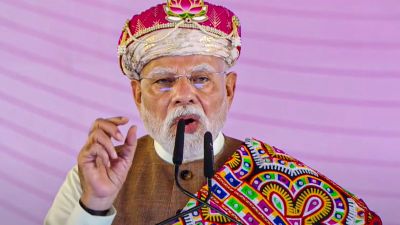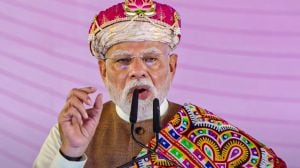Quake diplomacy and F-16s
As Pakistan grieves its dead — the official death toll from the earthquake is now at 38,000 — the world attention is turning to th...

As Pakistan grieves its dead — the official death toll from the earthquake is now at 38,000 — the world attention is turning to the massive challenges of rehabilitation and reconstruction of Jammu and Kashmir across the dividing line.
Amidst these harrowing moments in J&K, India’s own cautious quake diplomacy could easily be derailed by the impending US announcement on the sale of 77 F-16s fighter aircraft to Islamabad.
Many in Delhi are itching to project the F-16 sale, which has been in the works for more than a year, as a big failure for Indian diplomacy and a signal of American “tilt” towards Pakistan. All those surprised at the recent positive turn in Indo-US relations are ready to pounce and say, “We told you so; you can’t trust the Americans.”
While the timing, size and justification for the F-16 deal leaves the establishment in Delhi cold, India would do well to respond in a cold and calculated manner. Knee jerk responses would look good to domestic audiences but could create far too many complications for the triangular relationship with the US and Pakistan.
Indian diplomacy has lobbied for so long in major world capitals against the sale of any weapons systems Pakistan, we have forgotten the original rationale. Protesting against arms sales to Pakistan is a habit we find hard to kick despite the fundamental change in the Indo-Pak military equation since the subcontinent went nuclear in the late 1980s.
In the pre-nuclear age, the acquisition of any major weapons platform by Pakistan had the potential to upset the effective conventional military balance on India’s western sector. As a consequence, India had every reason to oppose advanced arms sales to Pakistan, from the US, Europe and China since the 1950s.
With an existential nuclear deterrence in place, bean counting of military aircraft on either side makes little sense. Incremental addition of new conventional weapons by Pakistan does little to destabilise the military environment in the subcontinent. In any case India’s own acquisition of major fighter aircraft in the last few years has ensured a robust air balance with Pakistan. While India has acquired Sukhois from Russia and Mirages from France and the Falcon air defence radar from the Israelis, Pakistan has not purchased any new fighter aircraft over the last decade and a half. Amidst this reality, India’s objections to arms sales to Pakistan will have little political credibility.
India’s central security concern no longer lies in the kind of conventional weapons that Pakistan might have in its armoury. India’s problems on the Western front arise from Pakistan’s ability to conduct with impunity a low intensity conflict under the nuclear gun.
To his unsung credit, Atal Bihari Vajpayee adeptly navigated the complex waters of India-US-Pakistan relationship through the six difficult years of 1998-2004. Instead of merely shouting against close US-Pak ties, he successfully manipulated that relationship to India’s advantage.
India’s focus under Vajpayee was to mobilise the American pressure on Pakistan to unconditionally vacate its aggression in Kargil in 1999 and give credible assurances on ending terrorism at the end of the military stand-off during 2001-02. Vajpayee converted one of Pakistan’s traditional strengths —the alliance like relationship with the US — into a lever to change Islamabad’s political behaviour towards New Delhi.
As the Bush administration readies to notify the US Congress on the F-16 sale any day now, the choice before Manmohan Singh is quite simple. He can either let the old habit of meeting US arms sales to Pakistan with rhetoric prevail. That in turn will destroy his attempt to transform India’s relationswith Islamabad and Washington. Or Manmohan Singh can turn the F-16 sale on its head, by embarking on an innovative diplomacy towards the US and Pakistan.
Although many have argued that India and Pakistan have missed the big moment on rethinking their relations after the quake, the reality has been otherwise. Despite its many accumulated sensitivities on Jammu and Kashmir, Pakistan has accepted Indian relief and assistance. On its part, India has respected Islamabad’s concerns and has largely avoided embarrassing it. As a result there has been tacit cooperation between the two military establishments in a variety of ways. This must be valued and built upon.
A number of assumptions should guide India’s quiet diplomacy after the earthquake tragedy. One, Pakistan has been shattered by the quake that has flattened Occupied Kashmir. Empathy and wisdom should guide India at this moment even as it makes a hard-headed assessment of the quake’s impact on the terrorist infrastructure in PoK.
Two, American influence in Islamabad is set to rise, as Pakistan struggles to cope with the long-term consequences of the quake. Growing American influence in Pakistan could be an advantage for India, provided New Delhi and Washington agree on next steps in changing the political dynamic in Jammu and Kashmir.
India must signal to the US that it is willing to overlook the F-16 sale if Washington can come with credible assurances from Pakistan that the terrorist infrastructure destroyed in PoK will not be rebuilt after the quake.
Such assurances from Pakistan coupled with a genuine commitment to end cross-border infiltration into J&K should allow India to reciprocate with such measures as an internal ceasefire with the militants and troop reduction in Kashmir.
In recent weeks, India had declared at the highest level that it is prepared to consider such actions if there is sustained evidence of change on Pakistan’s approach to cross-border terrorism. The quake provides a rare moment for India to try and make a new beginning in Kashmir.
Instead of being distracted by F-16 sale at this historic moment, New Delhi should focus like a laser beam on ending terrorism once and for all in the state, create the conditions for a purposeful dialogue and lay the foundations for a massive long-term reconstruction of the entire state in cooperation with Pakistan and the international community.
Photos


- 01
- 02
- 03
- 04
- 05





























